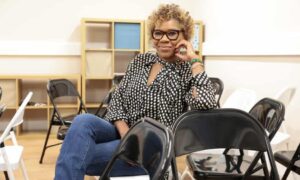
Tameeka Smith resigned as director of a well-known youth charity in 2019 after realising that being her own boss was more important to her than the security of being an employee.
Now the founder and director of Trimenco CIC, a nonprofit training, mentoring and coaching company, Smith has never been happier. “My wake-up moment was when the voice inside my head saying, ‘It’s time to leave’ was suddenly louder than the one saying, ‘You’ve got bills to pay,’” she said.
Smith realised that she needed autonomy to achieve her potential.
Starting her own business is the best decision she has ever made, Smith says. “I am now the conductor of my own orchestra, fully in the driving seat of my own career and life.”
A record number of women are following the same path: more than 150,000 new businesses were started by women in 2022, a historic high. “All female”-led companies now represent more than 20.5% of all UK businesses, up from 16.7% in 2018.
Many say they have turned to entrepreneurship for freedoms they felt were not available to them in traditional workplaces. The Fawcett Society’s report for equal payday this year found UK women aged 40 and older will not experience the closure of the gender pay gap until after they reach state pension age. Another found that women hold only one in five commercial roles on the boards of Britain’s 350 largest listed companies.
“These statistics exemplify the outdated attitudes and glass ceilings that exist in mainstream workplaces,” says Ameena Hamid, who founded her own production company when she felt that she had no control and was not taken seriously in the theatre industry.
“Many women don’t want to wait for their workplace to catch up with modern attitudes, and that’s why they’re going it alone: as an entrepreneur they’re able to find success without waiting for permission.”
Zhin Kader founded a clothing line, Estéra Swim, and the podcast, Fashion Tweak, because she became fed up working for a fashion industry that reduced her “big ideas and capability” to “just fetching boxes for more senior colleagues”.
Kader says: “My drive to entrepreneurship emerged from a blend of personal values and frustrations with the traditional workplace. My time in the fashion industry, marked by ethical dilemmas and a lack of inclusivity, contrasted sharply with my autism-driven ethical compass.
“I was entry-level for many years, regularly made redundant, and it was only when I pursued being more of my own boss and becoming a design consultant that I realised I was extremely competent and able to grow.”
